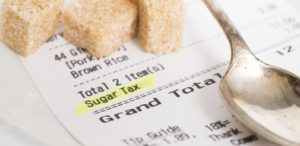
A British Medical Journal discussion on pro’s and con’s of a sugar tax provides a balanced discussion, but it’s clear that such taxes would have to be enormous to have an effect.
The discussion, “Could a sugar tax help obesity?”, featured Adjunct Professor Sirpa Sarlio-Lahteenkorva, a ministerial adviser in Finland’s Ministry of Social Affairs and Health, and Jack Winkler, Emeritus Professor of Nurition Policy at London Metropolitan University.
Prof Sarlio-Lahteenkorva argued that a specific tax on sugar would reduce consumption, while Prof Winkler said such taxes would have to be enormous to have any effect.
Some key points from the discussion:
- Obesity and taxation are both complex issues and it’s important to consider cross-elasticities of demand for foods, i.e. upping the price of soft drinks doesn’t mean people will eat more vegetables.
- While ‘sin’ taxes have been used to limit alcohol and tobacco use, food is a necessity and “overall consumption is relatively insensitive to price changes”. In short, people can stop smoking but they can’t stop eating.
- Tobacco taxes have been successful worldwide, but this is because they are levied at extremely high rates. The discussion says the United Kingdom rate is 348%.
- Quoting two British modelling studies on fizzy taxes, Prof Winkler notes: “One found that a 10% tax would reduce the average personal daily intake by 7.5ml, less than a sip. The other showed that a 20% tax would reduce consumption by 4 kilocalories.
- Effects of this will not reverse global obesity.”
- Research results predicting the success of sugar taxes are mixed. The discussion notes four studies from the Mexican experiment “all incomplete and by interested parties”. One claims a large reduction. The other three show small drops in consumption.
FGC comment
- In New Zealand, where there is already a 300% difference between the price of budget soda and that of the brand leader, if a sugar tax does affect buying behaviour, it’s more likely to make someone switch brands, rather than switch food groups altogether. Unless, of course, the tax is so high that it prices such drinks out of reach for poorer New Zealanders.
- In New Zealand, the tobacco tax rate is around 400%, not the 10%-20% being mooted for soda taxes.
- The studies from the Mexican experiment that show drops in consumption is not surprising, given the decline of full sugar carbonated drinks consumption worldwide mostly in countries without fizzy taxes.
- The discussion does not reference the facts that, according to Nielsen data, consumption volumes in Mexico have not significantly changed since their tax was introduced, the dollar value of the soft drink category grew by nearly 19% (103,354,522 pesos in May 2013 to 122,501,543 in May 2015), or that the Mexican Government collected 47% more tax from their people through the soda tax than it budgeted for.
- There’s no doubt that sugar taxes are a fast and reliable way for governments to collect money, but the stark truth is that sin taxes work only at high levels and by making some citizens a lot poorer. For foods where the demand is relatively inelastic, the question is always what will be the unintended consequences?
In the discussion, Professor Winkler also lays to rest the constant claims that sugar taxes have been used with success in several countries:
“Referendums in the United States have led to soft drinks taxes in just one city (Berkeley); they were rejected in more than 30 states and cities, including New York, Philadelphia, Washington, DC, and San Francisco.”
“Across the Atlantic, only four of 53 states in WHO Europe have adopted food taxes, all with the stated aim of raising revenue, not improving health. Denmark is the political omen, one of the most tax tolerant nations on Earth. It imposed fat taxes then repealed them a year later, after near universal opposition and widespread evasion.”
